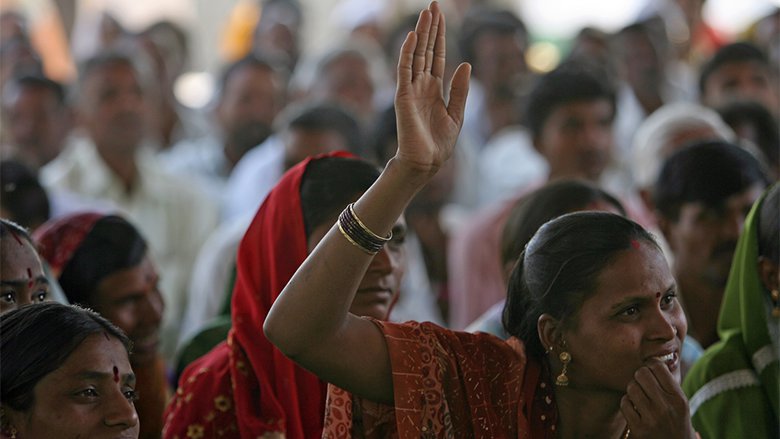Researching the politics of development
Blog

Two cheers for the (draft) 2017 Governance and the Law World Development Report

Brian Levy
21 September 2016
This post first appeared on Brian’s blog Working with the Grain.
The 2017 WDR (temporarily made available last week in draft form as an ‘almost-final’ public preview) is a landmark document for the development community. Historically, the point of departure for development practitioners (including those within the World Bank) has been to promulgate technocratic, ‘best practice’ solutions to development challenges. For more than two decades, this ‘best practice’ approach has been put into question by a growing avalanche of research on the political, institutional and governance underpinnings of development. The 2017 WDR does an heroic job of assembling and synthesizing this voluminous research into a compelling statement of why ‘best practices’ fail to address some core constraints, and thus do not achieve their intended results.
Some will doubtless critique the report for its somewhat promiscuous use of jargonistic terms – and determined effort to reframe the political/institutional literature around these terms. But empathy is called for. The WDR team surely confronted some formidable internal political challenges. It needed to frame its argumentation in a way that spoke directly to economists, who remain intellectually hegemonic within the organization. As important, it needed a framing that was politically acceptable across the range of the extraordinarily diverse constituencies that make up the Executive Directors of the Bank – from the United States, to China, to Russia, to the Nordic countries as well as Latin American, African and other Asian and European constituencies. My sense/hope is that the document has met this challenge. So a first loud cheer to the WDR for successfully, and hopefully irreversibly, consolidating the centrality of politics and institutions in the development discourse.
doubtless critique the report for its somewhat promiscuous use of jargonistic terms – and determined effort to reframe the political/institutional literature around these terms. But empathy is called for. The WDR team surely confronted some formidable internal political challenges. It needed to frame its argumentation in a way that spoke directly to economists, who remain intellectually hegemonic within the organization. As important, it needed a framing that was politically acceptable across the range of the extraordinarily diverse constituencies that make up the Executive Directors of the Bank – from the United States, to China, to Russia, to the Nordic countries as well as Latin American, African and other Asian and European constituencies. My sense/hope is that the document has met this challenge. So a first loud cheer to the WDR for successfully, and hopefully irreversibly, consolidating the centrality of politics and institutions in the development discourse.
Turning to my second cheer, the 2017 WDR powerfully makes the case that an ongoing capacity to adapt, both politically and economically, is crucial for sustainable development – and thus that high priority should be given to the continuing cultivation of adaptive policies and institutions. In making this point, the WDR embraces the insistence of Daron Acemoglu & James Robinson in their widely read book, Why Nations Fail, on the centrality of ‘inclusive institutions’ for development success. And, in coming down from the Olympian heights of Acemoglu & Robinson’s very-long-run historical analysis, it moves the discourse further. It uses its terminological innovations to direct attention towards the following varieties of entry points:
- ‘Contestability, preferences, and incentives’ – as key drivers of the possibility of change. (Note: ‘preferences’ is the way economists like to talk about ideas; and ‘incentives’ incorporates the role of institutions in shaping the rules of the game).
- ‘Exclusion, capture and clientelism’ – as ways in which asymmetries of power can become locked-in, blocking the capacity to adapt.
- ‘Power sharing, resource redistribution, sanctions and deterrence (agreement-enforcement), and dispute resolution institutions’ as entry points for fostering and sustaining agreements among contending parties. And:
- ‘Elite bargaining, citizen engagement and international influences’ as key drivers of change.
For all of its analytical richness, and the richness of its detailed examples, the WDR remains somewhat too conceptual to provide a detailed menu as to what agenda for action to foster adaptability might look like, but it provides powerful, useful guidance as to where the fault lines of vulnerability — and concrete entry points to foster adaptability — might be found. For this it deserves a hearty second cheer.
The WDR thus focuses laser-like on the capacity to adapt, and its short- medium- and long-run drivers. However, the uncompromising single-mindedness of its focus results in it leaving unaddressed some key, practical governance-related challenges. This is the reason why I withhold a third cheer – though my intent in highlighting the gap is in no way to diminish the very large contribution made by the document.
There are two types of governance-related development problems which the WDR leaves largely unaddressed.
First, development practitioners across the range of sectors (education, health, environment, infrastructure, social protection and myriad other areas…..) work in contexts where governance is weak, and political constraints are profound. A great deal of work has been undertaken in recent decades (under the rubrics of ‘thinking and working politically’, ‘working with the grain’, ‘doing development differently’ and ‘problem-driven iterative adaptation’) as to how it might be possible to achieve some development gains in difficult governance environments – taking a short-to-medium-term perspective, and without necessarily transforming the broader governance environment. The WDR gives very little time to this class of governance intervention – ones which take the pre-existing governance environment as given, and seek ways of nonetheless achieving some development gains. It would be a development tragedy if the document were to be interpreted as arguing against governance-related initiatives that have real prospects of improving peoples’ lives, even if they don’t add to the capacity to adapt.
Second, and related, there can be a difficult trade-off between governance-related initiatives that yield development gains in the short-to-medium run, but risk creating problems of adaptability over the longer-term. Here are two of many possible examples :
- In Mozambique, in the aftermath of civil war, should the country have moved rapidly to capitalize on prospects for investment in large-scale mega-projects, thereby cementing elite commitments to stability, but also locking-in rent-based elite bargains, (which is what they did) — or should it have attempted the painstaking and uncertain work of trying to build institutions capable of supporting broad-based growth, and in the interim leaving the political settlement vulnerable to reversal?
- In Indonesia (in the chaotic aftermath of President Soeharto’s exit) and in Afghanistan (in the immediate aftermath of the international military intervention which overthrew the Taliban) should governments and donors have co-operated on moving finance rapidly to poor citizens through community-driven development initiatives with special-purpose institutional arrangements (which they did), even though these might risk adding to the complexity of later efforts at systematic institutional development?
Mozambique went ahead with its mega-projects, and Indonesia and Afghanistan with their CDD initiatives. These decisions strike me as sensible, though they arguably are inconsistent with the logic of ‘adaptability’ above all.
To underscore: in highlighting these dilemmas, my intent is not to diminish the value of the WDR. Rather it is to point to a key added set of questions that matter for operationalization. In addressing dilemmas along these lines, it is crucial not to become trapped in ‘either/or’ thinking. If we are to make progress with the messy, complex challenges that emerge once we think about development through a governance lens, we need to be especially vigilant to ensure not to throw out babies with bathwater.
Read Brian Levy’s research on education in South Africa
